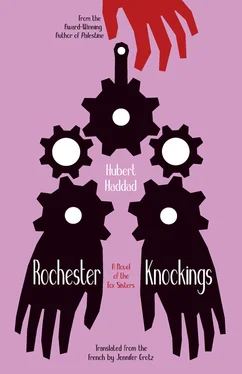“Like what was shaking you up to the point of falling down eight days ago in Philadelphia!”
Frank Strechen pulled Margaret out of the tavern before she had finished her glass. The still dense snow was being matted into a black mud. He hailed a cab and gave the driver the address of their hotel. On their way, Margaret heard from another planet the bitter reproaches of her manager. She thought about an erased world from which arose clusters of memories quickly covered by this pallid avalanche. The big house on Central Avenue, all shaky on her left, seemed tiny and dull to her under the storm’s redactions. At that moment, she remembered a promise and cried out to the coachman, leaving Frank Strechen speechless:
“Buffalo Street, right away! To the old cemetery!”
No one could have forbidden her this visit to her dear old Mother. In the last letter before she left, Kate had written her: “If ever you happen to pass by Rochester. .”
It reminded her of a song for drinking and crying that she sang with gusto:
If ever you pass by the old homestead
Pray step right inside for to see if I’m dead!
And drink to our love if you find I am gone
But love me again if you find me at home
IV.The Necromancers of the Old World
The Oceanic ’s twelve boilers fired one after another, vibrating the ship’s rigging and steel plates while the liner’s enormous funnel repeatedly exhausted its broth into a motionless sky, subsuming for a moment the two rear masts and nearly motionless sails unfurled by a rakish team of sailors. Leaning on the railing of the promenade deck, the first class passengers watched the maneuvers without understanding anything. Was there a lack of wind or too many crosscurrents? On the stern and bow of the lower decks, the third class crowd, less dense on the way back, made themselves comfortable as if on holiday. Chartered last year by the White Star Line and flying the British flag, the Oceanic had left New York and was en route to London without much fanfare, with its contingent of nouveaux riches heading home for the new year, disenchanted emigrants, and graying rejects of the British Isles or the old continent.
During the two weeks the crossing lasted, Kate, usually on deck, wrapped in her fur, let herself be invaded by the versatile breathing of the sky and the sea, sometimes more tenuous than the exhale of a dying person and then suddenly of an abyssal violence. She had never felt more delivered of herself, almost disembodied, stripped of that weight that a dream drags along in the guise of the human. Back in her cabin in rough weather, she couldn’t take her eyes off the sea. Poor dragons of foam and spray danced before her. This contrast of grays resembled her life: all the loneliness in the world behind a flashing porthole. Kate imagined an endless voyage to find serenity. After ten days of imprisonment behind the guard rails of bridges and the gangways, the restaurant, or her luxurious cabin, she told herself that nothing would prevent her, one night with a full moon, from letting herself slide overboard. Similar to the miraculous wind vibrating in the light, wandering souls that perished at sea were not burdened with those crippled obsessions around old cauldrons. Even the worst among them would cross one day the Cape of Good Hope on his ghost ship. And then what idiot medium would have the idea of invoking spirits on board a ship — everything there creaked and moved only in accordance to Neptune’s wishes! On the tenth day, finally delivered of a fearless sadness and completely astonished by the geyser of a whale or a ballet of porpoises, Kate knew that she wouldn’t lose equilibrium. One rolling morning, rushing to catch a flying fish that, while she was alone in her seat, landed thrashing on the deck, she had the vivid sensation of releasing a dove of ice back into the waves.
Approaching the Old World, washed of funereal influences by the ocean, she wanted to believe that everything would work itself out far from those fanatical Puritans, who from lack of roots had crowded around capricious spirits. On this side of the Atlantic, according to what she’d read, ghosts had the manners of propriety and a sense of family. “I am thy father’s spirit / Doomed for a certain term to walk the night,” wasn’t that in Hamlet ?
At the sight of the English coast, an unnamed fright gripped her again. What would they require of her now? And what kind of face to put on before her hosts? Like the end of a dreamed bridge, she crossed the landing stage like a sleepwalker. On land, destitute crowds, staggering women, hordes of raggedy children were bustling feebly at undefined tasks or prowling around the pontoons and docks like hairless dogs in the shadow of sailors and longshoremen. For one distraught second, Kate realized that a matte-complexioned porter was following her, her trunk hoisted upon a trolley. Then, with a determined air, a coachman in purple livery with copper buttons approached her.
An English eight-springed carriage was waiting for her on a quay shining with rain. Inside, after two nights of not sleeping, she gave herself over to the swelling sensation to close her eyes, head nodding, to the sound of the little trot ringing on the road, the carriage making a turn in her dream with the exact sonority of Old Billy’s hooves.
Benjamin Coleman’s staff had received her without ado in this Chelsea manor. It had the look of a dwarf fortress with its Gothic turrets and narrow windows, its paved courtyard between gargoyled façades and carved projections over an enormous gate armor-plated with fittings. Kate found herself without any transition in another universe, where the uncertain light and fresh air conflicted with the marmoreal mists from which arose antique architectural profiles. Everything there was different, charged simultaneously with mystery, almost of enmity, and with a very distant familiarity. This insidious sensation of having traveled back in time came over her on certain meanderings, when the cries of children behind the high walls of an institution, the brick-red face of a harmonium player on the corner of a street black with soot, the bird’s eye view of a park where a large folded paper bird was thrown, or simply this immutable iron-colored rain — they reminded her of something that she hadn’t lived, at least not yet, and that filled her with a mysterious nostalgia. If she’d had a doctrinaire head, like all those fresh zealots steeped in the antediluvian allegories of India or Tibet, Kate could easily have been convinced of spiritualist conjectures about the transmigration of souls, but she could not or would not understand the muddled speech of her peers. Past lives for her were tangible every minute. As for the enlightened progression of souls, Mister Splitfoot had never said a word about it. However, that gave her enough free time to bear with good grace the sagacious interrogations of Mr. Coleman’s friends.
London fascinated her even more than New York by what its dark and adventurous reputation concealed: it was there, in those monotonous streets, along the Thames when the Tower Bridge raises as the offshore rigs enter the harbor, among the serious crowds of Oxford Street, under the arcades of the Royal Opera House or in the gardens of Hampton Court, that so many of her heroes suffered the drama of their destiny. She hardly made a distinction between such literary characters and their authors. And so Shakespeare, Anthony Trollope, or Dickens, whose recent death she’d just learned of, haunted the same places alongside Ben Jonson’s alchemist or Daniel Defoe’s plague victims. Discovering Vanity Fair in the Livermore library, shortly before her departure, she identified with the young Amelia only because her good friend Becky seemed irresistible despite suspicious origins, and it’s actually her rather than Thackeray that she caught herself looking for in the streets of London. Alone on board a horse-drawn carriage or flanked by a silent chaperone, she loved to lose herself in this immensity that in her eyes was more populated than the whole of America, albeit with fewer colors, except for the turbaned Hindus with cobra stares. In the unreality of an unfamiliar environment bringing up false memories in her, Kate saw everything strangely slowed-down, as if emerging from out of a dark cloth woven in different times. Each time she crossed over a bridge, those drowned below made a sign to her. On a hill in Hyde Park, surprised by the snow one late afternoon when the gas lamps were lit in the city, she thought she saw through the swirling one of the washers of the shroud, one of those materialized spirits — infanticide mother burned alive or decapitated streetwalker — that are called Midnight Washerwomen , and returned in a hurry to Chelsea, overwhelmed by the fear that some misfortune had happened on the other side of the world.
Читать дальше












